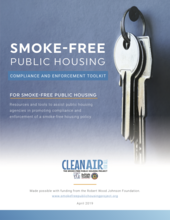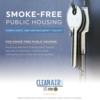0
Video
Community:
Jun 12, 2020
By age three, lower-income children are often well behind their more affluent peers in language and literacy skills, leading to gaps in school readiness by kindergarten and beyond. Addressing these gaps requires solutions that span beyond school hours into the informal places where families live, learn and play. This session will highlight in research and practice how everyday spaces - laundromats, playgrounds, supermarkets, hospital waiting rooms, and others – can transform into literacy-rich environments with learning opportunities for families and young children. Speakers will also discuss how these partnerships apply to the design and utilization of affordable housing developments.
Authored by: CLPHA
Topics: Housing, Summit 2020
 Shared by Steve Lucas
Shared by Steve Lucas
Steve Lucas posted a
on Jun 12, 2020
By age three, lower-income children are often well behind their more affluent peers in language and literacy skills, leading to gaps in school readiness by kindergarten and beyond.
0
Video
Community:
Jun 12, 2020
Housing is fundamental for generating better outcomes in education, health, racial equity, and more; yet housing providers neither can nor should take on major outcome goals alone. This session will engage participants in deep and interactive dialogue about the role that housing providers can play in collective impact and how housing and other partners can work together toward a shared vision for change. With background framing from the Urban Institute, presenters from StriveTogether, Enterprise Community Partners, and an innovative housing authority will share lessons from their experiences as part of a participatory session on effective collective local impact partnerships.
Authored by: CLPHA
Topics: Education, Housing, Summit 2020
 Shared by Steve Lucas
Shared by Steve Lucas
Steve Lucas posted a
on Jun 12, 2020
Housing is fundamental for generating better outcomes in education, health, racial equity, and more; yet housing providers neither can nor should take on major outcome goals alone.
0
Video
Community:
Jun 12, 2020
Community health workers (CHW) can be vital to ensuring individuals and communities accessing the full range of healthcare and social services they need. Housing authorities and their health partners are increasingly looking for ways to train and deploy CHWs in their communities to help improve health outcomes, improve satisfaction with care, lower healthcare costs, and minimize health disparities. This session will explore several PHAs training residents to become CHWs. Participants will learn of the deliberative process undertaken to design proofs of concept that feature cross-sector partnerships, metrics determination, data collection and sharing approaches, evaluation planning, anticipated outcomes and strategies for replicability.
Authored by: CLPHA
Topics: Health, Housing, Summit 2020
 Shared by Steve Lucas
Shared by Steve Lucas
Steve Lucas posted a
on Jun 12, 2020
Community health workers (CHW) can be vital to ensuring individuals and communities accessing the full range of healthcare and social services they need.
0
Video
Community:
Jun 12, 2020
Following our 2020 Summit Keynote Speaker Congresswoman Donna Shalala, we will hear from a roundtable comprised of a national Medicaid payer, large housing authority, and essential health care service provider about improving outcomes through innovative collaboration between the health and housing sectors. As a Medicaid managed care organization, UnitedHealthcare Community & State has forged partnerships with public housing authorities (PHAs) and federally qualified health centers (FQHCs) to address the social determinants of health of those individuals accessing the Medicaid system. UnitedHealthcare will be joined in this conversation by the Housing Authority of the City of Austin and Bread for the City (an FQHC in Washington, DC) to discuss the importance of including all of these partners at the table. Especially in light of the COVID-19 pandemic, which has placed public health and social inequities front and center, we are reminded of the importance of partnerships with an “all hands on deck” approach to produce results.
Authored by: CLPHA
Topics: Health, Housing, Summit 2020
 Shared by Steve Lucas
Shared by Steve Lucas
Steve Lucas posted a
on Jun 12, 2020
Following our 2020 Summit Keynote Speaker Congresswoman Donna Shalala, we will hear from a roundtable comprised of a national Medicaid payer, large housing authority, and essential health care service provider about improving outcomes through innovative collaboration between the health and housing s
0
Video
Community:
Jun 12, 2020
Housing providers and public health experts share insights from building cross-sector health and housing partnerships. King County Housing Authority, Seattle Housing Authority, and Public Health - Seattle & King County have integrated housing data with Medicaid and Medicare data to better understand resident health needs and inform health initiatives. Leveraging this linked dataset, Dr. Craig Pollack is investigating the effects of receiving housing assistance on health outcomes. Vancouver Housing Authority is part of the Health and Housing Innovation Partnership, which aims to increase housing options for people with complex behavioral and physical health conditions and to better integrate health care services with the housing. Yakima Housing Authority recently became a Supported Employment provider under a new Washington State Medicaid Program, requiring the agency to become more connected to the state’s Medicaid system.
Authored by: CLPHA
Topics: Health, Housing, Summit 2020
 Shared by Steve Lucas
Shared by Steve Lucas
Steve Lucas posted a
on Jun 12, 2020
Housing providers and public health experts share insights from building cross-sector health and housing partnerships.
0
Video
Community:
Jun 12, 2020
Focused on advancing equitable results for families and children, this session will examine the cross-sector partnerships used in Norfolk and Asheville. Participants will learn about proven approaches on how education and housing providers can collaboratively create a population level result, how to use data to inform strategy development, how to conduct a factor analysis, how to formulate targeted and universal strategies, and how to establish baselines, targets and performance measures. Leaders from city governments, school districts, and the housing authorities will share insights and engage attendees in discussion.
Authored by: CLPHA
Topics: Education, Housing, Summit 2020
 Shared by Steve Lucas
Shared by Steve Lucas
Steve Lucas posted a
on Jun 12, 2020
Focused on advancing equitable results for families and children, this session will examine the cross-sector partnerships used in Norfolk and Asheville.
0
Video
Community:
Jun 12, 2020
COVID-19 is disproportionately impacting the health of low income housing residents and minority communities. Those who have symptoms of COVID-19 may not have the knowledge and resources to prevent the spread of infection, to seek appropriate healthcare, and to maintain quarantine. Lack of experience with telemedicine and lack of home blood pressure and glucose monitoring devices will result in worsening chronic disease health outcomes. Furthermore, the increased financial and emotional stress during the COVID-19 epidemic may result in increased need for mental health support.
The Bringing Health Home (BHH) Program, a collaboration between the Housing Authority of the City of Austin and the University of Texas Dell Medical School and funding provided by the St. David's Foundation, has trained and hired residents as state-certified Community Health Workers (CHW) to conduct virtual outreach to their neighbors at the largest public housing community to assess and address needs in the context of COVID-19.
Using CDC guidelines, the CHWs assess their peers over the phone for COVID-19 symptoms, reinforce preventative measures, link them to testing and medical care, when indicated, and connect them to other available resources, as needed. With this support, it has been possible for BHH residents with COVID-19 to maintain self-isolation and minimize transmission. The BHH team will share the work they are doing to prevent health disparities, minimize COVID-19 deaths, contain the virus, and protect the public welfare by supporting COVID-19 positive households with customized relief packages and symptom monitoring as they remain under quarantine.
Authored by: CLPHA
Topics: Health, Housing, Seniors, Summit 2020
 Shared by Steve Lucas
Shared by Steve Lucas
Steve Lucas posted a
on Jun 12, 2020
COVID-19 is disproportionately impacting the health of low income housing residents and minority communities. Those who have symptoms of COVID-19 may not have the knowledge and resources to prevent the spread of infection, to seek appropriate healthcare, and to maintain quarantine.
0
Video
Community:
Jun 12, 2020
This session allowed participants to form and go deeper in their partnerships through a systems level approach. How are your partnerships considering the six conditions of systems change of policies, practices, relationships, resource flows, power dynamics, and mental modes? The Seattle Housing Authority and Seattle Public Schools Partnership has taken a systems level approach, reviewing the opportunities for integration and alignment of policies, practices, and relationships while staying true to our values of family engagement and trauma-informed practice. We provide examples from our partnership and will also facilitate the idea generating and sharing among all participants.
Authored by: CLPHA
Topics: Education, Housing, Summit 2020
 Shared by Steve Lucas
Shared by Steve Lucas
Steve Lucas posted a
on Jun 12, 2020
This session allowed participants to form and go deeper in their partnerships through a systems level approach. How are your partnerships considering the six conditions of systems change of policies, practices, relationships, resource flows, power dynamics, and mental modes?
0
Video
Community:
Jun 12, 2020
June 4-5, Hosted Virtually via Zoom | Opening remarks by CLPHA President Stephen Norman and CLPHA Executive Director Sunia Zaterman followed by a roundtable discussion featuring voices from the housing, health, and education sectors. We kicked off the Summit with a Plenary Roundtable (starting at 20:53): Cross-Sector Crisis Response -- What We Are Learning About Cross-Sector Collaboration from COVID-19. About the panel: Partnerships have always been critical to improving life outcomes for low-income individuals and families. The global coronavirus pandemic has highlighted how crucial these partnerships are and how fractured our safety net systems remain. The health, economic, and educational consequences of COVID-19 have further imperiled already vulnerable people who face new and worsening challenges. Collaboration at the intersection of housing, education, and public health has been key to effective community responses to the pandemic. This roundtable will discuss how COVID-19 has compelled organizations to work differently to serve those in need and what lasting changes we can anticipate across sectors in the coming months and years. Panelists will specifically address the issues of out-of-school time, public health, connectivity, and social isolation for low-income residents.
Authored by: CLPHA
Topics: Education, Health, Housing, Summit 2020
 Shared by Steve Lucas
Shared by Steve Lucas
Steve Lucas posted a
on Jun 12, 2020
June 4-5, Hosted Virtually via Zoom | Opening remarks by CLPHA President Stephen Norman and CLPHA Executive Director Sunia Zaterman followed by a roundtable discussion featuring voices from the housing, health, and education sectors.
0
Video
Community:
Jun 12, 2020
June 4-5, 2020, Hosted Virtually via Zoom
Authored by: CLPHA
Topics: Funding, Health, Housing, Medicaid / Medicare, Summit 2020
 Shared by Steve Lucas
Shared by Steve Lucas
Steve Lucas posted a
on Jun 12, 2020
June 4-5, 2020, Hosted Virtually via Zoom
0
Publication
Community:
Oct 3, 2019
A majority of property managers report that a smoke-free policy is largely well followed and self enforced by residents and staff. However, it is not uncommon for a small minority of residents to struggle or refuse to comply by continuing to smoke or allowing their guests to smoke on the property. These resources and tools can assist management in promoting compliance and enforcing the policy when necessary. If you would like to consult on solutions specific to your situation, reach out to info@smokefreepublichousingproject.org.
Authored by: Clean Air for All
Topics: Health, Healthy homes, Smoke-free
 Shared by Jackie Siewert
Shared by Jackie Siewert
Jackie Siewert posted a
on Oct 3, 2019
A majority of property managers report that a smoke-free policy is largely well followed and self enforced by residents and staff. However, it is not uncommon for a small minority of residents to struggle or refuse to comply by continuing to smoke or allowing their guests to smoke on the property.
0
Research
Community:
Aug 5, 2019
CLPHA developed a general data sharing template that public housing authorities (PHAs) and their health partners can customize to suit their data sharing and collaboration needs. Please feel free to comment to share any uses/modifications your organization made to implement into a partnership.
Authored by:
Topics: Affordable Care Act, CLPHA, Community development, Cost effectiveness, Data sharing, Dental, Depression, Dual-eligibles, Funding, Health, Healthy homes, Legislation & Policy, Low-income, Medicaid / Medicare, Mental health, Metrics, MTW, Nutrition, Obesity, Partnerships, Place-based, Preventative care, Racial inequalities, Research, SAMHSA, Smoke-free, Stability, Substance abuse, Supportive housing, Sustainability, TA
 Shared by Steve Lucas
Shared by Steve Lucas
Steve Lucas posted a
on Aug 5, 2019
Disclaimer: This template is provided for informational purposes only and not for the purpose of providing legal advice. You should contact your attorney to obtain advice with respect to any particular issue or question. Use of this template, including its exhibits and attachments, does not create a relationship or any responsibilities between CLPHA and the user.
CLPHA developed a general data sharing template that public housing authorities (PHAs) and their health partners can customize to suit their data sharing and collaboration needs. Please feel free to comment to share any uses/modifications your organization made to implement into a partnership.
0
Publication
Community:
May 30, 2019
A more regional approach to care is needed – one that involves coordinated, person-centered healthcare with robust connections to social services and community resources. An innovative infrastructure to do just that is underway in four communities across New Jersey: Trenton, Camden, Newark, and Paterson. Efforts begun in 2011 under New Jersey’s Medicaid Accountable Care Organization (ACO) Demonstration Project have evolved into four regional collaboratives that integrate, coordinate, and align all the disconnected programs aimed at making communities healthier.
Authored by: Kathleen Noonan and Jon Tew for Camden Coaliton of Healthcare Providers
Topics: Data sharing, East Coast, Health, Partnerships
 Shared by Housing Is
Shared by Housing Is
Housing Is posted a
on Jun 13, 2019
Kathleen Noonan and Jon Tew for Camden Coaliton of Healthcare Providers
A more regional approach to care is needed – one that involves coordinated, person-centered healthcare with robust connections to social services and community resources.
0
Research
Community:
Mar 25, 2019
The articles below are part of a special collection commemorating 25 years of the Health Care System Research Network’s (HCSRN's) rigorous research to improve health outcomes and health systems’ performance by leveraging electronic health data. This new collection highlights, among other things, advances in personalized cancer care, the optimal use of AI in health care, and the evolution of common data models, featuring work from Kaiser Permanente, Intermountain Healthcare and others.
Authored by: The Journal for Electronic Health Data and Methods
Topics: Data sharing, Health, Partnerships, Research
 Shared by Housing Is
Shared by Housing Is
Housing Is posted a
on Jun 13, 2019
The Journal for Electronic Health Data and Methods
The articles below are part of a special collection commemorating 25 years of the Health Care System Research Network’s (HCSRN's) rigorous research to improve health outcomes and health systems’ performance by leveraging electronic health data.
0
Video
Community:
Jun 12, 2019
Zoning is a way for communities to separate land by use or form. But from the start, zoning has separated more than just land uses. It has also separated people. As a result, we pay the cost in public health, racial and economic injustices, higher housing costs, and more.
Authored by: How Housing Matters for The Urban Institute
Topics: Housing, Legislation & Policy, Racial inequalities
 Shared by Housing Is
Shared by Housing Is
Housing Is posted a
on Jun 13, 2019
How Housing Matters for The Urban Institute
Zoning is a way for communities to separate land by use or form. But from the start, zoning has separated more than just land uses. It has also separated people. As a result, we pay the cost in public health, racial and economic injustices, higher housing costs, and more.
0
Publication
Community:
Jun 12, 2019
Zoning rules dictate more than just how we can use and build on land. They also shape our communities and our lives. Land use laws determine where we can find housing, schools, and parks—and who has access to them.
Authored by: Maya Brennan, Emily Peiffer, and Kimberly Burrowes for How Housing Matters, The Urban Institute
Topics: Health, Housing, Legislation & Policy, Racial inequalities
 Shared by Housing Is
Shared by Housing Is
Housing Is posted a
on Jun 13, 2019
Maya Brennan, Emily Peiffer, and Kimberly Burrowes for How Housing Matters, The Urban Institute
Zoning rules dictate more than just how we can use and build on land. They also shape our communities and our lives. Land use laws determine where we can find housing, schools, and parks—and who has access to them.
0
Publication
Community:
Opened in summer 2018 on the north side of Columbus, Ohio, Laurel Green Apartments is an affordable permanent supportive housing development for residents with mental health conditions.
Authored by: PD&R Edge Online Magazine
Topics: Homelessness, Housing, Low-income, Mental health, Supportive housing
 Shared by Housing Is
Shared by Housing Is
Housing Is posted a
on Jun 11, 2019
PD&R Edge Online Magazine
Opened in summer 2018 on the north side of Columbus, Ohio, Laurel Green Apartments is an affordable permanent supportive housing development for residents with mental health conditions.
0
Publication
Community:
Jun 11, 2019
The Trump Administration is publicly weighing plans to gradually lower the official poverty line by applying a smaller cost-of-living adjustment each year. Doing so would be unjustified for several reasons.
Authored by: Arloc Sherman and Paul Van de Water for The Center on Budget and Policy Priorities
Topics: Child welfare, Food insecurity, Legislation & Policy, Low-income, Nutrition, Stability
 Shared by Housing Is
Shared by Housing Is
Housing Is posted a
on Jun 11, 2019
Arloc Sherman and Paul Van de Water for The Center on Budget and Policy Priorities
The Trump Administration is publicly weighing plans to gradually lower the official poverty line by applying a smaller cost-of-living adjustment each year. Doing so would be unjustified for several reasons.
0
Publication
Community:
Jun 11, 2019
Authored by Civic and the Everyone Graduates Center at the Johns Hopkins University School of Education, and released annually in partnership with the Alliance for Excellent Education and America’s Promise Alliance, the Building a Grad Nation report examines both progress and challenges toward reaching the GradNation campaign goal of a national on-time graduation rate of 90 percent.
Authored by: Civic and the Everyone Graduates Center at Johns Hopkins University School of Education
Topics: Education, Low-income, Research, Youth
 Shared by Housing Is
Shared by Housing Is
Housing Is posted a
on Jun 11, 2019
Civic and the Everyone Graduates Center at Johns Hopkins University School of Education
Authored by Civic and the Everyone Graduates Center at the Johns Hopkins University School of Education, and released annually in partnership with the Alliance for Excellent Education and America’s Promise Alliance, the Building a Grad Nation report examines both progress and challenges toward reach
0
Publication
Community:
This paper analyzes why SNAP benefits are inadequate, reviews the body of research showing positive effects from more adequate SNAP benefits, and offers key policy solutions to improve benefit adequacy.
Authored by: Food Research & Action Center (FRAC)
Topics: Food insecurity, Health, Legislation & Policy, Low-income, Nutrition, Research
 Shared by Housing Is
Shared by Housing Is
Housing Is posted a
on Jun 11, 2019
Food Research & Action Center (FRAC)
This paper analyzes why SNAP benefits are inadequate, reviews the body of research showing positive effects from more adequate SNAP benefits, and offers key policy solutions to improve benefit adequacy.
0
Video
Community:
Jun 3, 2019
On June 3, Governance Studies at Brookings cohosted an event with Contexts Magazine, featuring an expert panel that discussed the causes, consequences, and policy solutions to the racial wealth gap.
Authored by: The Brookings Institution
Topics: Racial inequalities, Research
 Shared by Housing Is
Shared by Housing Is
Housing Is posted a
on Jun 11, 2019
The Brookings Institution
On June 3, Governance Studies at Brookings cohosted an event with Contexts Magazine, featuring an expert panel that discussed the causes, consequences, and policy solutions to the racial wealth gap.
0
Research
Community:
Jun 5, 2019
A new report by Chapin Hall at the University of Chicago finds that youth homelessness has its origins in early family experiences, including family homelessness. The findings make painfully clear that housing alone is insufficient to prevent and “end” youth homelessness, and that addressing youth homelessness alone, without explicit connections and fervent attention to family homelessness, will result in continued homelessness for all populations.
Authored by: SchoolHouse Connection
Topics: Early childhood, Homelessness, Housing, Legislation & Policy
 Shared by Housing Is
Shared by Housing Is
Housing Is posted a
on Jun 5, 2019
A new report by Chapin Hall at the University of Chicago finds that youth homelessness has its origins in early family experiences, including family homelessness.
0
Research
Community:
May 30, 2019
Children experiencing homelessness or living in inadequate and unstable housing are exposed to many risks, including a heightened threat of involvement with the child welfare system. Can child welfare agencies play a role in addressing the lack of affordable housing? What if providing housing, plus other supportive services, could prevent out-of-home placements to foster care? What if, for those children already in foster care, it could help them reunify with their parents?
Authored by: Mary K. Cunningham, Mike Pergamit, and Sarah Gillespie for The Urban Institute
Topics: Child welfare, Research, Stability, Supportive housing
 Shared by Housing Is
Shared by Housing Is
Housing Is posted a
on May 30, 2019
Mary K. Cunningham, Mike Pergamit, and Sarah Gillespie for The Urban Institute
Children experiencing homelessness or living in inadequate and unstable housing are exposed to many risks, including a heightened threat of involvement with the child welfare system. Can child welfare agencies play a role in addressing the lack of affordable housing?
0
Publication
Community:
May 1, 2019
Navigating college as a first-generation college student can feel like making your way through a maze with no map, filled with “learn as you go” lessons, and “wow, I wish I knew this then.” When you combine it with being low-income, homeless, and/or food insecure, it can feel like you’re navigating the same maze blindfolded, on a tightrope, balancing multiple responsibilities. It should not be like this.
Authored by: Miguel Arellano Sanchez for SchoolHouse Connection
Topics: Low-income, Post-secondary, Stability, Youth
 Shared by Housing Is
Shared by Housing Is
Housing Is posted a
on May 29, 2019
Miguel Arellano Sanchez for SchoolHouse Connection
Navigating college as a first-generation college student can feel like making your way through a maze with no map, filled with “learn as you go” lessons, and “wow, I wish I knew this then.” When you combine it with being low-income, homeless, and/or food insecure, it can feel like you’re navigating
0
Publication
Community:
May 24, 2019
There’s a growing body of evidence that positively links affordable, stable, and quality housing with improved educational outcomes for children. That research continually points to the positive return on investment for the earliest possible intervention. Housing authorities are uniquely poised to help change the trajectory for low-income children who typically arrive in kindergarten already substantially behind their peers. We can leverage unique assets that other systems players cannot.
Authored by: Betsey Martens and Erica Plut for Journal of Housing and Community Development
Topics: Early childhood, Education, Housing, Out-of-school time, Partnerships
 Shared by Housing Is
Shared by Housing Is
Housing Is posted a
on May 28, 2019
Betsey Martens and Erica Plut for Journal of Housing and Community Development
There’s a growing body of evidence that positively links affordable, stable, and quality housing with improved educational outcomes for children. That research continually points to the positive return on investment for the earliest possible intervention.
 Shared by Steve Lucas
on Jun 12, 2020
Shared by Steve Lucas
on Jun 12, 2020
 Shared by Steve Lucas
on Jun 12, 2020
Shared by Steve Lucas
on Jun 12, 2020
 Shared by Steve Lucas
on Jun 12, 2020
Shared by Steve Lucas
on Jun 12, 2020
 Shared by Steve Lucas
on Jun 12, 2020
Shared by Steve Lucas
on Jun 12, 2020
 Shared by Steve Lucas
on Jun 12, 2020
Shared by Steve Lucas
on Jun 12, 2020
 Shared by Steve Lucas
on Jun 12, 2020
Shared by Steve Lucas
on Jun 12, 2020
 Shared by Steve Lucas
on Jun 12, 2020
Shared by Steve Lucas
on Jun 12, 2020
 Shared by Steve Lucas
on Jun 12, 2020
Shared by Steve Lucas
on Jun 12, 2020
 Shared by Steve Lucas
on Jun 12, 2020
Shared by Steve Lucas
on Jun 12, 2020
 Shared by Steve Lucas
on Jun 12, 2020
Shared by Steve Lucas
on Jun 12, 2020

 Shared by Jackie Siewert
on Oct 3, 2019
Shared by Jackie Siewert
on Oct 3, 2019

 Shared by Steve Lucas
on Aug 5, 2019
Shared by Steve Lucas
on Aug 5, 2019

 Shared by Housing Is
on Jun 13, 2019
Shared by Housing Is
on Jun 13, 2019

 Shared by Housing Is
on Jun 13, 2019
Shared by Housing Is
on Jun 13, 2019
 Shared by Housing Is
on Jun 13, 2019
Shared by Housing Is
on Jun 13, 2019
 Shared by Housing Is
on Jun 13, 2019
Shared by Housing Is
on Jun 13, 2019

 Shared by Housing Is
on Jun 11, 2019
Shared by Housing Is
on Jun 11, 2019

 Shared by Housing Is
on Jun 11, 2019
Shared by Housing Is
on Jun 11, 2019
 Shared by Housing Is
on Jun 11, 2019
Shared by Housing Is
on Jun 11, 2019

 Shared by Housing Is
on Jun 11, 2019
Shared by Housing Is
on Jun 11, 2019

 Shared by Housing Is
on Jun 11, 2019
Shared by Housing Is
on Jun 11, 2019

 Shared by Housing Is
on Jun 5, 2019
Shared by Housing Is
on Jun 5, 2019

 Shared by Housing Is
on May 30, 2019
Shared by Housing Is
on May 30, 2019

 Shared by Housing Is
on May 29, 2019
Shared by Housing Is
on May 29, 2019

 Shared by Housing Is
on May 28, 2019
Shared by Housing Is
on May 28, 2019



